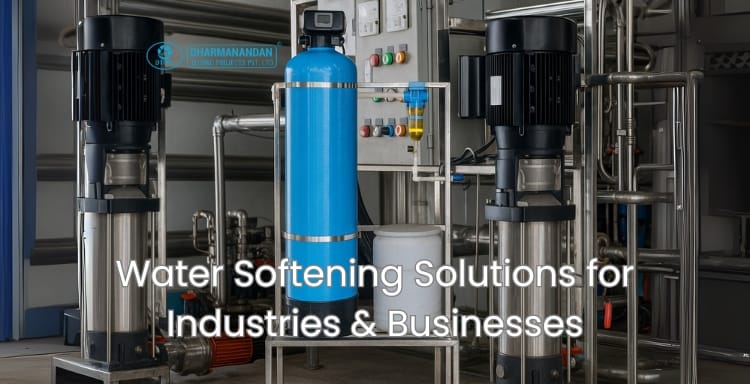
Table of Contents
Water Softening Plant FAQs on Industrial and Commercial Applications
July 29, 2025
Water hardness has been a persistent issue affecting industries, commercial establishments, and households alike. Water Softening Plants or Water Softener Machines are indispensable solutions to tackle scale formation, equipment damage, and poor water efficiency.
This article presents some questions and answers with in-depth insights. It is especially helpful for factory owners, facility managers, institutional buyers, OEMs, and commercial service providers who are considering the setup, operation, or expansion of a water softening unit.
Backed by the expertise of Dharmanandan Techno Project Pvt. Ltd., a leading name in water treatment technology, this article touches on every vital aspect – from installation and pricing to global export demand and practical industry usage.
Whether you’re in food processing, pharmaceuticals, hospitality, laundry, or residential water management – this guide will help you make informed decisions about choosing the right Water Softener Machine
What is a Water Softening Plant and why is it essential for industries and households?
A Water Softening Plant is a specialized water treatment system designed to remove hardness-causing minerals like calcium and magnesium. These minerals form scales in pipelines, boilers, heat exchangers, and domestic plumbing, causing damage and reducing efficiency. For industries like textile, food processing, and pharma, soft water is crucial for machinery protection and product quality. For households, it improves detergent performance and extends appliance life.
How does a Water Softener Machine work and what are its key components?
A Water Softener Machine uses an ion-exchange process in which hard ions (Ca²⁺ and Mg²⁺) are replaced with sodium (Na⁺) ions using resin beds. The key components are the pressure vessel, ion-exchange resin, brine tank, multi-port valves, and FRP or SS piping. Dharmanandan’s models are pre-engineered with automatic regeneration options and offer both domestic and industrial scale solutions.
What are the commercial applications of a Water Softening Plant?
A Water Softening Plant is used across commercial setups like hotels, laundries, car washes, hospitals, office buildings, and restaurants. It ensures better performance of dishwashers, boilers, and HVAC systems. It also reduces operational costs by preventing mineral scaling and improving soap efficiency, which matters in high-consumption zones.
Which industries need an industrial-grade Water Softener Machine the most?
Industries like pharmaceuticals, textiles, chemicals, power plants, food & beverage, pulp and paper, and dairy require Water Softener Machines to prevent boiler and chiller scaling, protect RO membranes, and ensure quality compliance. DTPPL’s higher-capacity models (500 LPH – 10,000 LPH) are tailored for these sectors.
How much water hardness can a Water Softening Plant treat effectively?
A Water Softening Plant can treat water with hardness levels up to 1200 PPM or more depending on the model. Most domestic setups require reduction to <50 PPM, whereas industrial applications aim for even lower residual hardness for equipment longevity and water chemistry balance.
What are the installation requirements for an industrial Water Softener Machine?
Installing a Water Softener Machine requires a stable base, access to raw water inlet, drainage for regeneration, power connection (for automatic models), and a brine tank area. DTPPL provides layout assistance and complete installation support for both retrofitting and new systems across India and abroad.
What are the long-term benefits of using a Water Softener Machine?
A Water Softener Machine extends the lifespan of plumbing systems, geysers, cooling towers, and water heaters. It reduces detergent and soap consumption by up to 50%, lowers electricity bills by maintaining thermal conductivity, and enhances skin and hair health in residential usage.
Is the Water Softening Plant suitable for high TDS or only for hard water?
A Water Softening Plant is specifically designed for hardness (Ca & Mg removal) and is not a TDS controller. If your source water has high TDS (>1000 ppm), you may need to install a Reverse Osmosis system in conjunction with the softener. DTPPL offers combined solutions for high-TDS industrial zones.
What is the cost of a Water Softener Machine for industrial use in India?
The price of a Water Softener Machine depends on capacity, automation level, resin type, and installation complexity. For accurate and competitive pricing, we recommend contacting Dharmanandan Techno Project Pvt. Ltd. directly, as they offer customized systems and turnkey support across India and overseas.
Read Our Article: All About Water Softening Plant
Can a Water Softener Machine be used before a Commercial RO Plant?
Yes, a Water Softener Machine is often installed before a Commercial RO Plant to reduce the scaling risk and prolong membrane life. Soft water improves RO system efficiency, reduces maintenance frequency, and ensures better permeate flow. This is common in industries like packaged drinking water, pharma, and dairy.
What is the difference between a domestic and industrial Water Softening Plant?
A domestic Water Softening Plant typically has a small flow rate (100–500 LPH) and simpler manual operation. In contrast, an industrial Water Softening Plant offers larger capacities (1000–10,000+ LPH), automatic regeneration, higher resin volume, and compatibility with boilers, chillers, and HVAC systems.
Which cities in India have the highest demand for Water Softener Machines?
Cities like Delhi, Mumbai, Ahmedabad, Pune, Hyderabad, Bengaluru, Chennai, Surat, and Jaipur have rising demand for Water Softener Machines due to hard municipal water, increasing industrial zones, and large residential townships. DTPPL serves all these regions with local and centralized support.
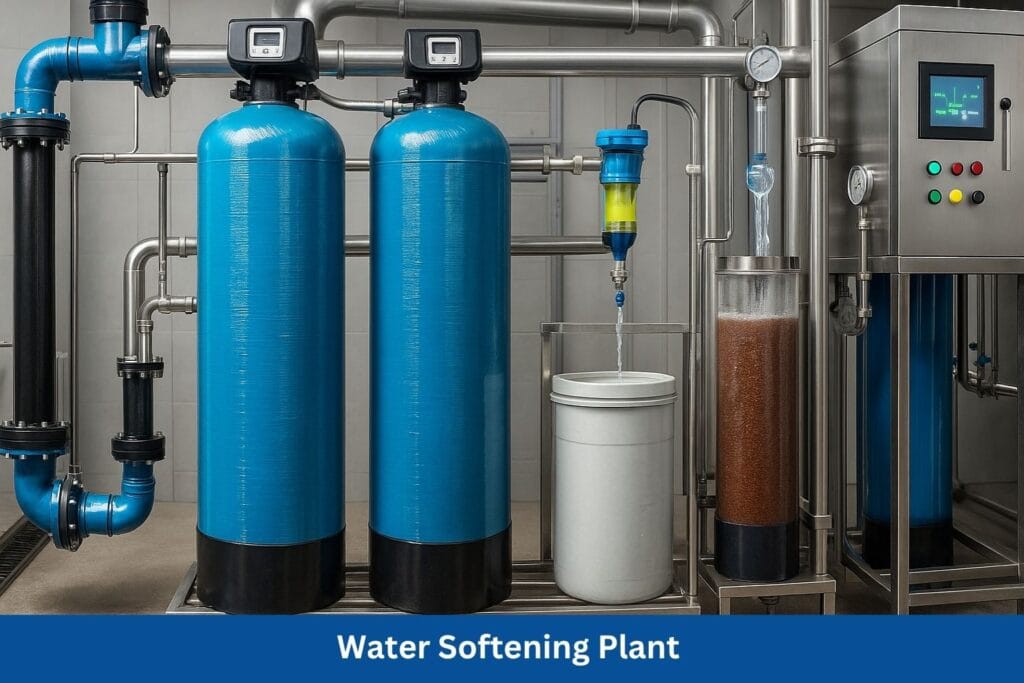
Can the Water Softener Machine handle borewell and well water?
Yes, a Water Softener Machine can treat borewell and well water, provided iron and suspended solids are within acceptable limits. In case of high iron, a pre-treatment iron removal filter is recommended before the softener to avoid resin fouling and performance drop.
What kind of maintenance does a Water Softening Plant require?
Routine maintenance of a Water Softening Plant includes checking salt/brine levels, ensuring proper regeneration cycles, cleaning strainers, and periodic inspection of the control valves. DTPPL offers annual maintenance contracts (AMC) and remote support services for peace of mind.
What are the financial assistance options available for installing a Water Softener Machine?
Companies can avail of MSME loans, industrial equipment financing, or bank term loans for purchasing a Water Softener Machine. DTPPL provides proforma invoices and technical documentation required by banks or NBFCs to facilitate financing for both domestic and global clients.
Are there government incentives or subsidies available for Water Softening Plants?
Though there is no direct subsidy on Water Softening Plants, some green industry initiatives, MSME programs, and environmental compliance funds may offer support indirectly. Especially in sectors like food processing and pharmaceuticals, subsidies are often available for complete water treatment systems.
What is automatic regeneration in an industrial Water Softener Machine?
Automatic regeneration in a Water Softener Machine refers to the process where the resin bed is flushed and recharged with brine solution automatically after a preset volume of water is treated or after a specific time cycle. This saves manpower and maintains consistent performance. DTPPL’s fully automatic models are preferred in hospitals, factories, and commercial complexes.
How can I get a custom-designed Water Softening Plant for my factory?
You can get a custom-designed Water Softening Plant by contacting Dharmanandan Techno Project Pvt. Ltd. Their team will assess your water report, flow rate requirements, space availability, and application type to provide a tailored, cost-effective solution that meets Indian and international standards.
Read Our Article: 5 Key Factors to Consider While Choosing a Water Softening System
What are the major components used in an industrial Water Softening Plant?
An industrial Water Softening Plant includes:
- FRP/SS/HDPE Pressure Vessel
- Ion Exchange Resin
- Brine Tank
- Multifunction Valve or Controller
- Piping & Flow Meters
- Salt Dosing System
DTPPL designs plants using high-quality components for heavy-duty industrial applications.
Is there any export demand for Water Softener Machines?
Yes, there is growing international demand for Water Softener Machines in countries like UAE, Kenya, Nigeria, Bangladesh, Nepal, Vietnam, South Africa, and Saudi Arabia, especially for hotels, hospitals, factories, and water bottling plants. DTPPL exports tailored systems with global quality standards and documentation.
Can a Water Softening Plant be combined with other water treatment systems?
Yes, a Water Softening Plant can be integrated with:
- Sand Filters / Carbon Filters
- RO Plants
- UV Disinfection
- Iron Removal Units
This combination ensures comprehensive treatment and long-term protection of plumbing and machinery.
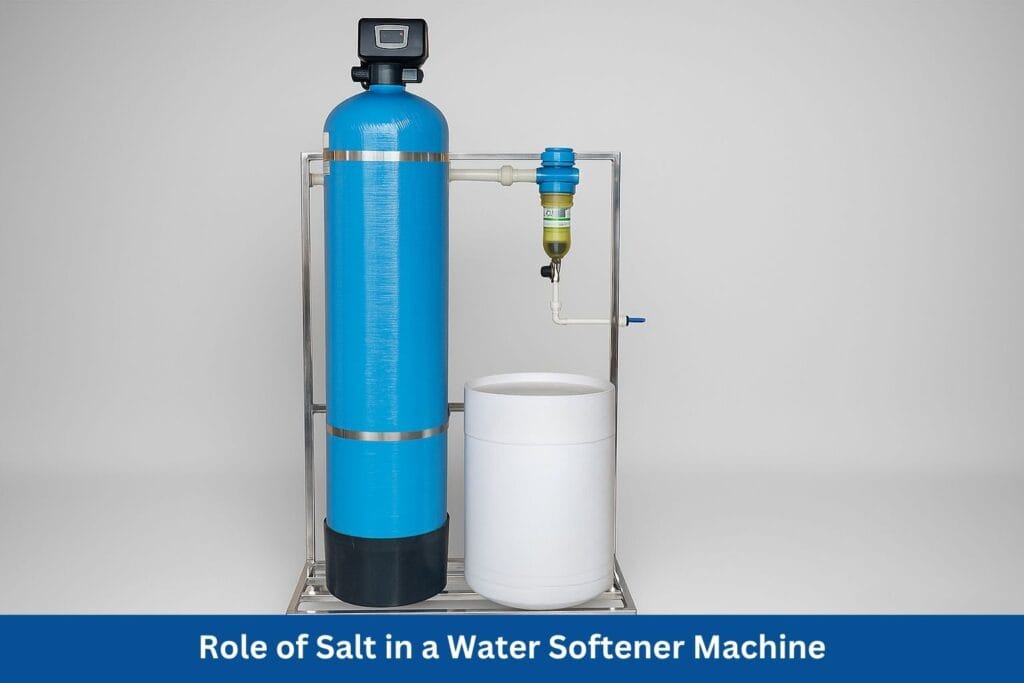
What is the role of salt in a Water Softener Machine?
Salt (NaCl) is used to regenerate the resin in a Water Softener Machine. It helps remove hardness-causing ions (Ca++, Mg++) by replacing them with sodium ions, making water soft again. DTPPL’s systems are optimized for minimal salt usage while ensuring effective regeneration.
Can I use a Water Softening Plant for food or pharmaceutical industries?
Absolutely. Water Softening Plants are crucial in food processing, beverages, pharmaceuticals, cosmetics, and dairy industries to avoid scaling, improve product quality, and meet regulatory water quality norms. DTPPL provides hygienic, stainless-steel-compatible solutions for such sectors.
How much floor space is required for installing a Water Softener Machine?
The space required depends on the capacity. A 1000 LPH Water Softener Machine may need as little as 2 ft x 3 ft, while an industrial 10,000 LPH setup may require 6 ft x 10 ft. DTPPL also offers compact skid-mounted designs for limited-space sites like rooftops or basements.
What are the signs of resin exhaustion in a Water Softening Plant?
Signs include:
- Increase in hardness in output water
- More frequent regeneration cycles
- Poor lathering of soaps
- Scale formation in pipes and equipment
If observed, consult DTPPL for a resin health check or replacement service.
Can Water Softener Machines be used in textile and dyeing industries?
Yes, the textile and dyeing industry requires soft water for dye bonding, color vibrancy, and equipment safety. Water Softener Machines help reduce fabric rejections and increase dye uptake. DTPPL supplies solutions specifically customized for textile plants across India and abroad.
How can I monitor and automate my Water Softener Machine?
DTPPL offers automatic and semi-automatic Water Softener Machines with digital controllers, flow-based regeneration, and real-time salt level indicators. You can also integrate with SCADA or BMS for large plants to monitor performance remotely.
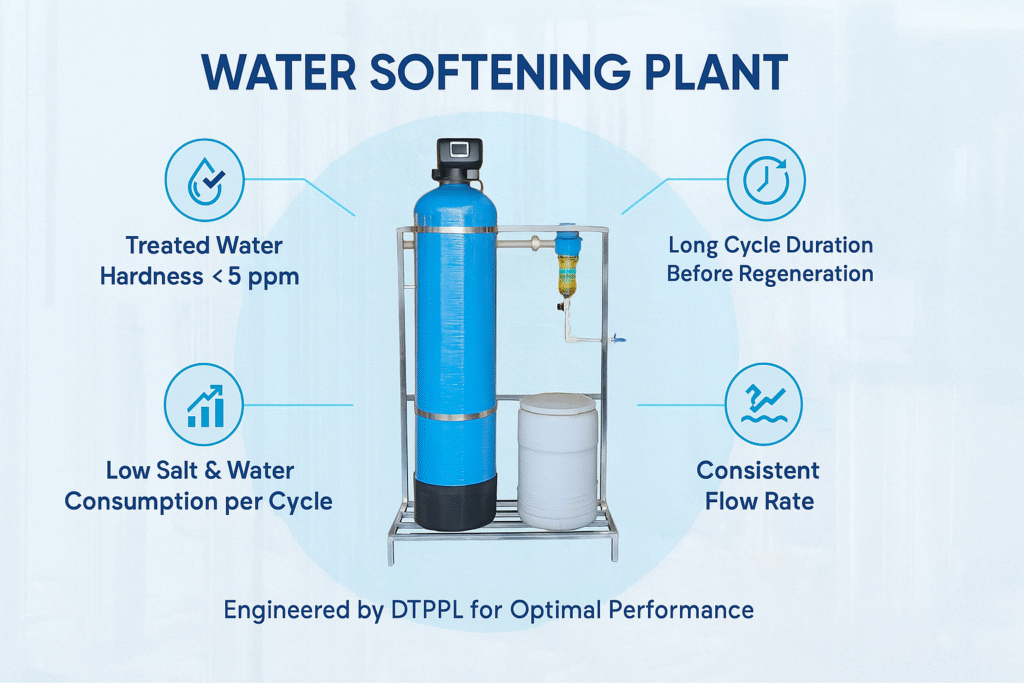
How is the performance of a Water Softening Plant measured?
The performance of a Water Softening Plant is measured by:
- Hardness level of treated water (should be <5 ppm)
- Cycle duration before resin regeneration
- Salt and water consumption per cycle
- Flow rate consistency
DTPPL ensures optimal performance through plant-specific design and quality components.
Is there any AMC (Annual Maintenance Contract) available for Water Softener Machines?
Yes, DTPPL offers comprehensive AMC plans for Water Softener Machines, including:
- Scheduled resin checks
- Valve inspections
- Salt dosing calibration
- Emergency support
These contracts reduce downtime and ensure long-term plant efficiency.
What is the price of an industrial Water Softening Plant in India?
The cost of an industrial Water Softening Plant varies based on capacity, automation level, material, and application. For accurate pricing tailored to your requirements, it’s best to contact Dharmanandan Techno Project Pvt. Ltd. directly.
Can I get financing or loan assistance for Water Softening Machines?
Yes, financing for Water Softening Machines is possible through:
- MSME business loans
- Startup grants
- Bank term loans
- Government water infrastructure schemes
DTPPL helps with required documentation, technical specs, and supplier credentials for loan processing.
What are the electrical requirements for a Water Softening Plant?
Most Water Softening Plants require single-phase or three-phase connections depending on automation. For manual systems, power is only needed for pumps. DTPPL ensures compatibility with your site’s power supply and offers low-power-consuming models.
Do Water Softener Machines require skilled manpower to operate?
Basic Water Softener Machines are easy to operate with minimal training. However, automatic systems need basic technical know-how for timer or flow settings. DTPPL offers on-site or video training post-installation for all clients.
How is wastewater generated during regeneration handled?
During regeneration, brine water is flushed out. For small Water Softening Plants, this can go into normal drains. For large plants, DTPPL recommends:
- Collection tanks
- Neutralization pits
- Reuse in non-critical applications (e.g., gardening)
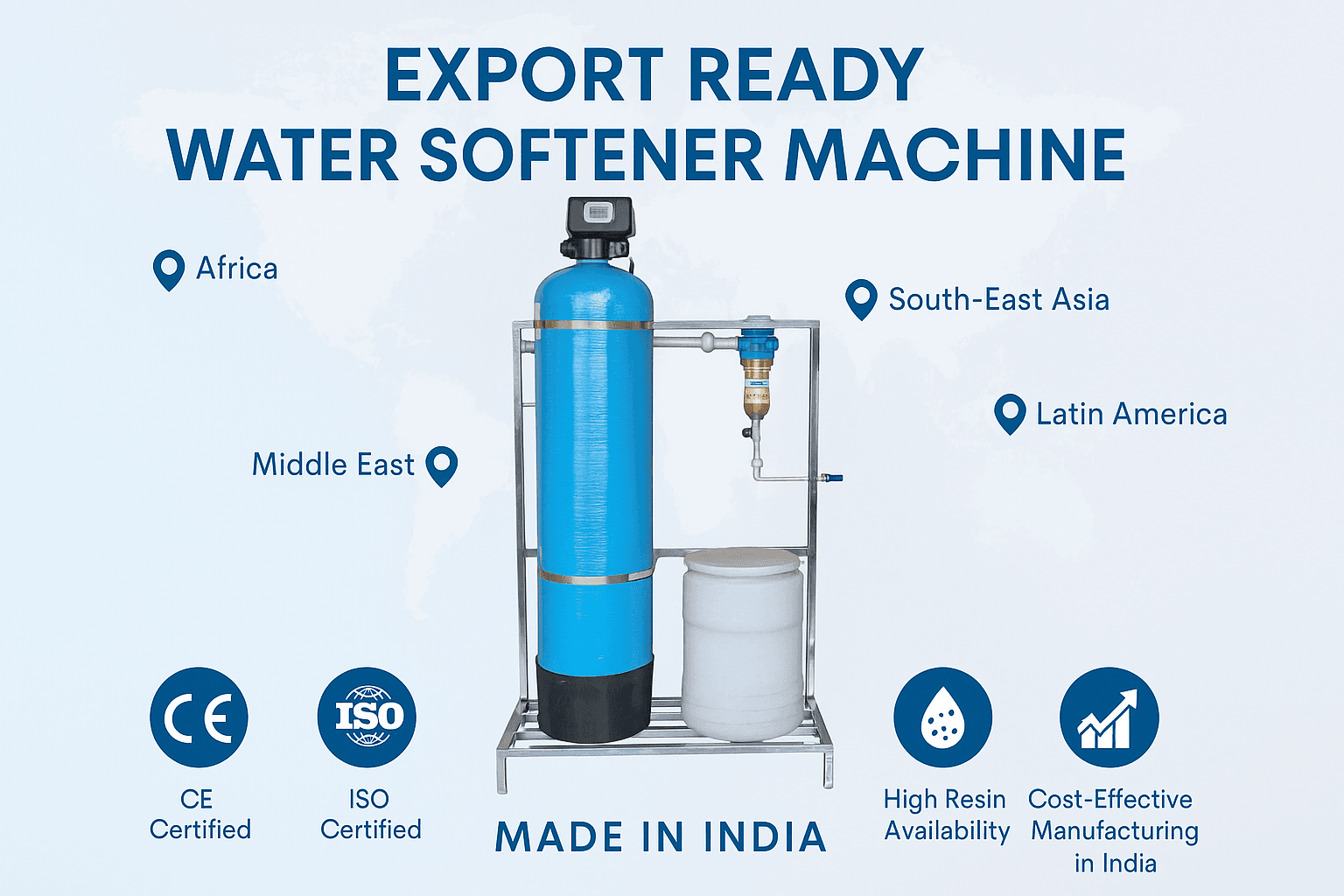
What is the export scope of Water Softener Machines from India?
India is a manufacturing hub for Water Softener Machines due to cost-effective production, skilled engineering, and high resin availability. DTPPL exports to:
- Africa
- Middle East
- South-East Asia
- Latin America
With CE-compliant and ISO-certified designs, the global demand is steadily increasing.
Can Water Softening Plants be customized as per factory layout?
Yes, Water Softening Plants can be fully customized by Dharmanandan Techno Project Pvt. Ltd. based on:
- Available area
- Inlet/output pipe positions
- Storage tank location
- Manual or automatic control preference
This ensures optimal plant integration without disturbing existing operations.
Is there a growing demand for Water Softener Machines in hospitality and hotels?
Absolutely. Water Softener Machines are in high demand in:
- Hotels
- Resorts
- Banquet halls
- Restaurants
to protect plumbing, boilers, geysers, and ensure soft water for laundry and guest use. DTPPL supplies compact and aesthetic models ideal for hospitality setups.
How does a Water Softener Machine help in car washing plants?
In car washing units, Water Softening Machines help by:
- Preventing watermarks on vehicle surfaces
- Reducing detergent consumption
- Enhancing shine and finish
It results in better customer experience and saves operational costs.
What is the role of Water Softening Plants in power plants and boiler rooms?
In boiler-based industries and power generation plants, Water Softening Plants are essential to prevent:
- Boiler scaling
- Heat exchanger damage
- Energy loss
Soft water ensures higher efficiency and longer boiler life, making it a critical utility.
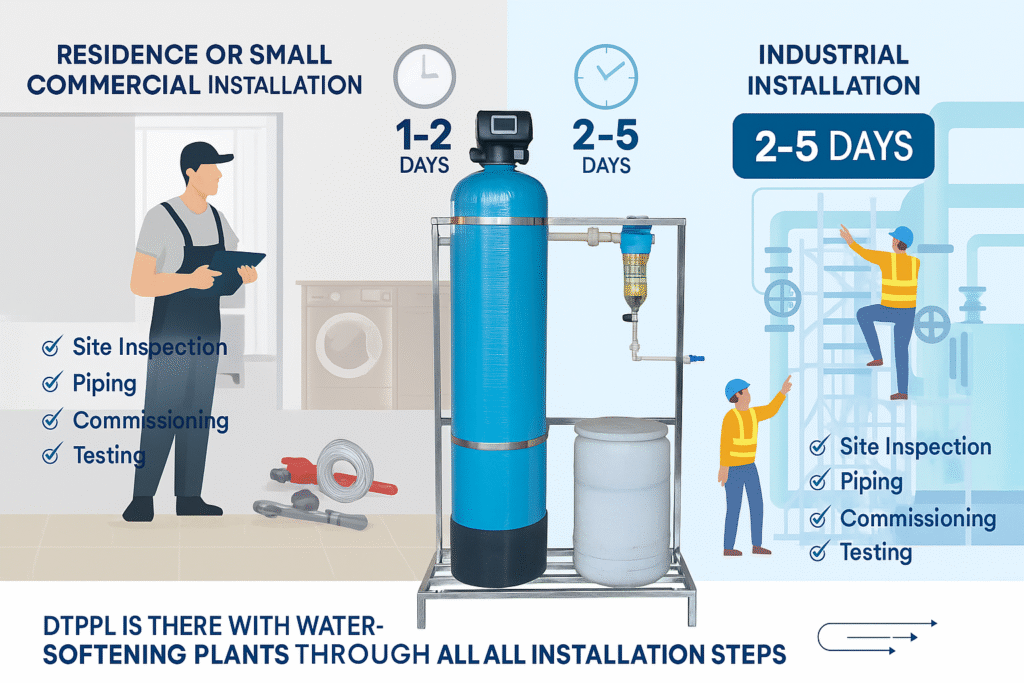
How much time does it take to install a Water Softening Plant?
Installation of a Water Softening Plant typically takes:
- 1–2 days for domestic/commercial models
- 2–5 days for large-scale industrial setups
DTPPL handles everything from site inspection to piping, commissioning, and testing.
How do I choose between an automatic and manual Water Softener Machine?
- Manual Machines: Budget-friendly, ideal for small setups with limited water use
- Automatic Machines: Timer- or flow-based regeneration, no manual intervention, suited for factories, hospitals, and continuous usage
DTPPL guides clients based on water consumption and budget.
Where can I get the best consultation and pricing for Water Softening Plants?
For expert advice, plant design, and customized pricing of Water Softening Plants and Water Softener Machines, it is recommended to contact Dharmanandan Techno Project Pvt. Ltd. directly. They provide complete technical support, layout planning, financial guidance, and after-sales service both in India and internationally.
Conclusion
The role of a Water Softening Plant or Water Softener Machine goes far beyond just removing hardness from water. It contributes significantly to enhancing equipment life, reducing energy consumption, and improving the overall quality of output in various industries and applications.
With increasing demand in India and across global markets like Africa, the Middle East, and Southeast Asia, businesses are actively looking for efficient, cost-effective, and scalable softening solutions. Dharmanandan Techno Project Pvt. Ltd. stands out as a trusted partner in delivering both standard and customized water softener systems backed by robust technical support.
For those seeking pricing, setup assistance, AMC services, or export support – it is highly recommended to directly contact Dharmanandan Techno Project Pvt. Ltd. to ensure you get the right solution tailored to your exact needs.
About Author
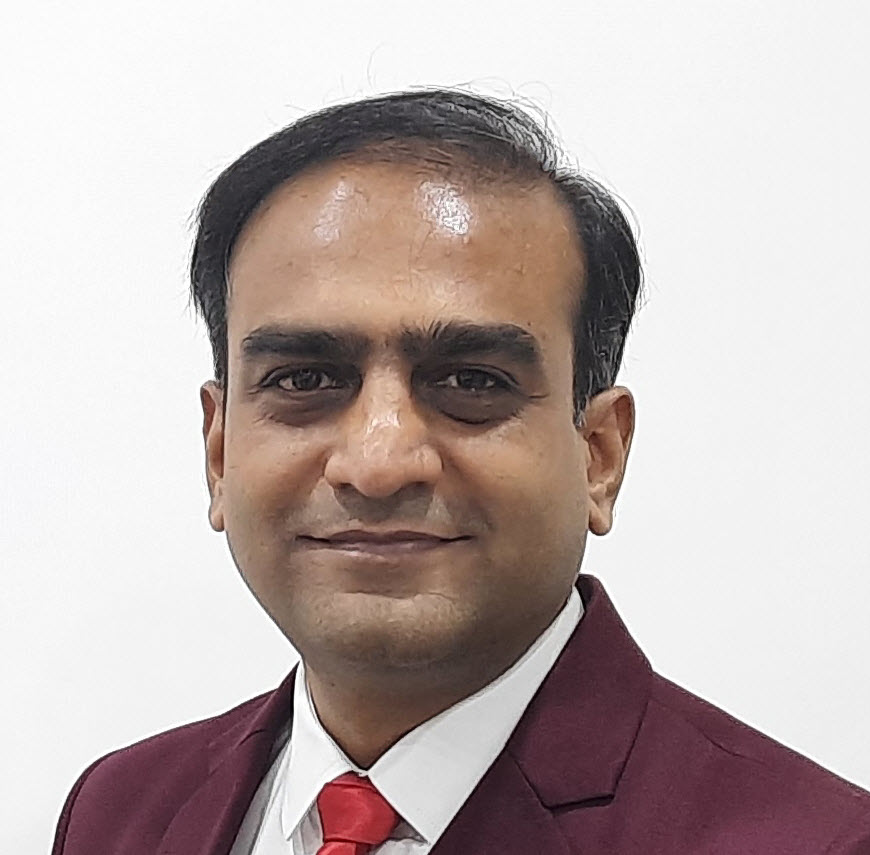
Director – Global Marketing and Sales
Mr. Bhavesh from Dharmanandan Techno Projects Pvt. Ltd. has played a pivotal role in elevating the DTPPL brand to the global stage, leveraging his exceptional expertise in marketing and communications. He is committed to helping clients achieve significant growth while strengthening their own brands. Dharmanandan Techno Projects Pvt. Ltd. is a leading manufacturer and supplier of water purification systems and turnkey solutions for mineral water plants. With years of experience in designing and delivering high-quality water treatment solutions, the company provides end-to-end services, including system design, installation, maintenance, and ongoing support. Specializing in scalable and customizable water plants, DTPPL has successfully served industries worldwide, ensuring clean and safe drinking water across diverse applications.




